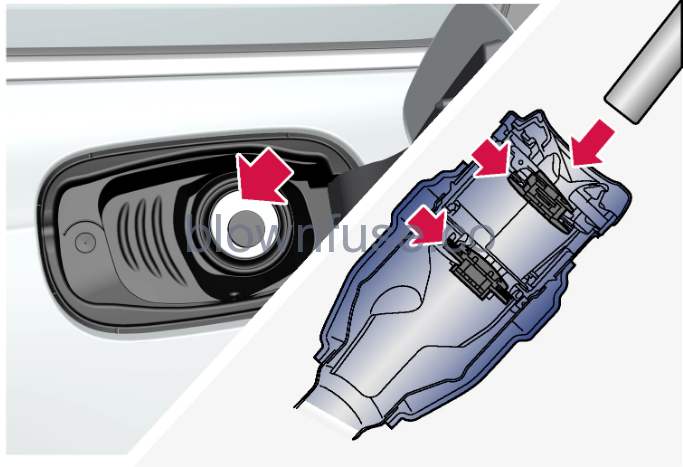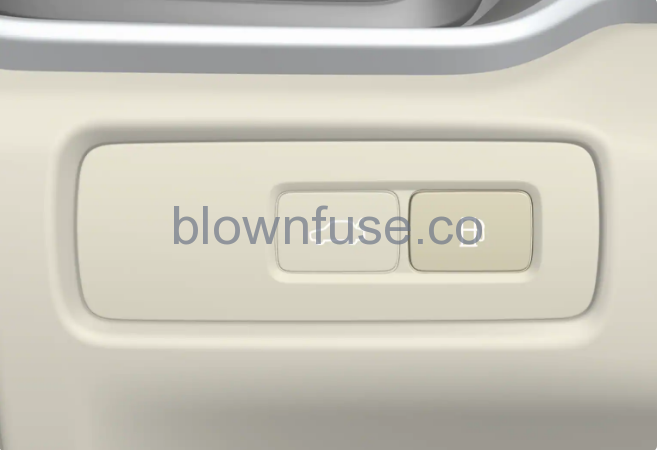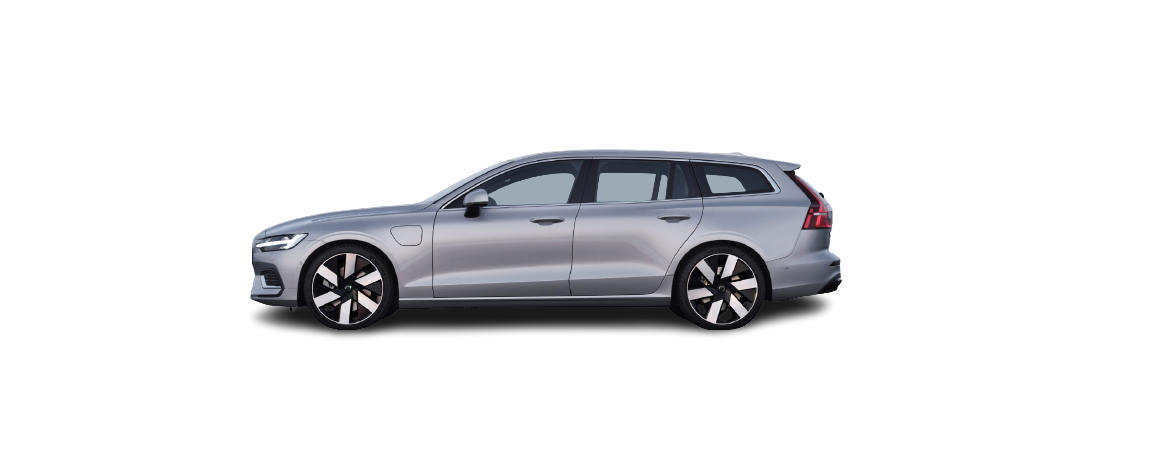2023 Volvo S60 Recharge Plug-in Hybrid Refueling

Handling of fuel
Do not use fuel with a lower quality than that recommended by Volvo, as this will negatively affect engine power and fuel consumption.
Warning
- Always avoid inhaling fuel vapour and getting fuel splashes in the eyes.
- In the event of fuel in the eyes, remove any contact lenses and rinse the eyes in plenty of water for at least 15 minutes and seek medical attention.
- Never swallow fuel. Fuels such as petrol, bioethanol and mixtures of them and diesel are highly toxic and could cause permanent injury or be fatal if swallowed. Seek medical attention immediately if fuel has been swallowed.
- Fuel which spills onto the ground can be ignited.
- Switch off the fuel-driven heater before starting to refuel.
- Never carry an activated mobile phone when refuelling. The ring signal could cause spark build-up and ignite petrol fumes, leading to fire and injury.
Important
Mixtures of various fuel types or use of fuels which are not recommended will invalidate Volvo’s guarantees and any supplementary service agreements; this is applicable to all engines.
Mixtures of various fuel types or use of fuels which are not recommended will invalidate Volvo’s guarantees and any supplementary service agreements; this is applicable to all engines.
Fuel consumption and CO2 emissions
Fuel consumption and CO2 emissions can be negatively impacted by a number of factors.
Examples of causes of increased fuel consumption include:
- If the car is not regularly charged from the mains.
- If the car is equipped with extra equipment that affects its weight.
- Driving style.
- If the customer chooses wheels other than those mounted as standard on the basic version of the model, this could increase rolling resistance.
- High speed causes increased air resistance.
- Fuel quality, road and traffic conditions, weather and the condition of the car.
A combination of the examples above could increase consumption considerably.
Note
Extreme weather conditions, driving with a trailer or driving at high altitudes, in combination with poorer fuel quality than recommended, are factors that considerably increase the car’s fuel consumption.
Extreme weather conditions, driving with a trailer or driving at high altitudes, in combination with poorer fuel quality than recommended, are factors that considerably increase the car’s fuel consumption.
Petrol station
- Use the car’s navigation system in order to find the route to the closest petrol station.
- When stopping to refuel it is a good idea to make a general inspection of the car as well, such as checking tyre pressure, bulbs, wiper blades, topping up washer fluid, etc.
Fuel tank – volume
The fuel tank’s filling capacity can be read in the table below.
| All engines | |
|---|---|
| Litres (approx) | 60 |
| US gallons (approx) | 15,9 |
Filling fuel
The fuel tank is fitted with a coverless fuel filler system.
Refueling the car at a petrol station

- It is important to feed the pump nozzle past the filler pipe’s two openable hatches before starting to fuel the car.
- Fuelling instruction:
- Switch off the car and open the fuel filler flap.
Note
-
- After the fuel filler flap has been opened, refuelling must take place within about 15 minutes. After this, the valve that was opened by pressing the button to open the fuel filler cap is closed, and it is no longer possible to refuel because the pump nozzle cuts out.
- If the valve is closed before refuelling is complete – press the button again and wait until the driver display shows the message Ready for refueling.
- Choose fuel that is approved for use in the car. See information on approved fuels in the section on “Petrol”.
- Insert the pump nozzle in the fuel filler opening. The filler pipe has two opening caps. The pump nozzle must be pushed past both caps before refuelling is started.
- Do not overfill the tank but fill until the pump nozzle cuts out the first time.
-
- The tank is full.
Note
Overfilled fuel in the tank can overflow in hot weather.
Overfilled fuel in the tank can overflow in hot weather.
Topping up fuel from a fuel canWhen filling with a fuel can, use the funnel located in the foam block under the floor hatch in the cargo area.
- Open the fuel filler flap.
- Insert the funnel in the fuel filler opening. The filler pipe has two opening caps. The funnel’s pipe must be pushed past both caps before filling can be started.
Applicable to cars with fuel-driven auxiliary heater
Never use the fuel-driven heater when the car is in a filling station area.
Never use the fuel-driven heater when the car is in a filling station area.
Opening and closing the fuel filler flap
The fuel filler flap is unlocked by pressing a button on the instrument panel.

- Press the button on the instrument panel.
- Pressure equalization of the fuel tank involves a certain delay in opening the flap. The message Preparing for refuel Fuel lid will be unlocked when ready appears in the driver display, and when the system is ready the message Ready for refueling appears in the driver display. If the internal combustion engine is switched on when the button is pressed, it is generally switched off and the car switches to electric mode.
Note
- After the fuel filler flap has been opened, refuelling must take place within about 15 minutes. After this, the valve that was opened by pressing the button to open the fuel filler cap is closed, and it is no longer possible to refuel because the pump nozzle cuts out.
- If the valve is closed before refuelling is complete – press the button again and wait until the driver display shows the message Ready for refueling.
- After refuelling is finished – close the flap with a gentle press.

